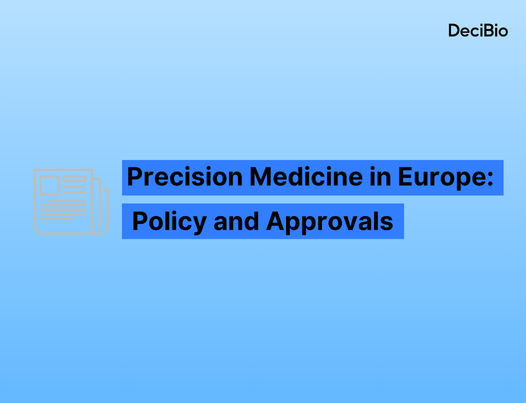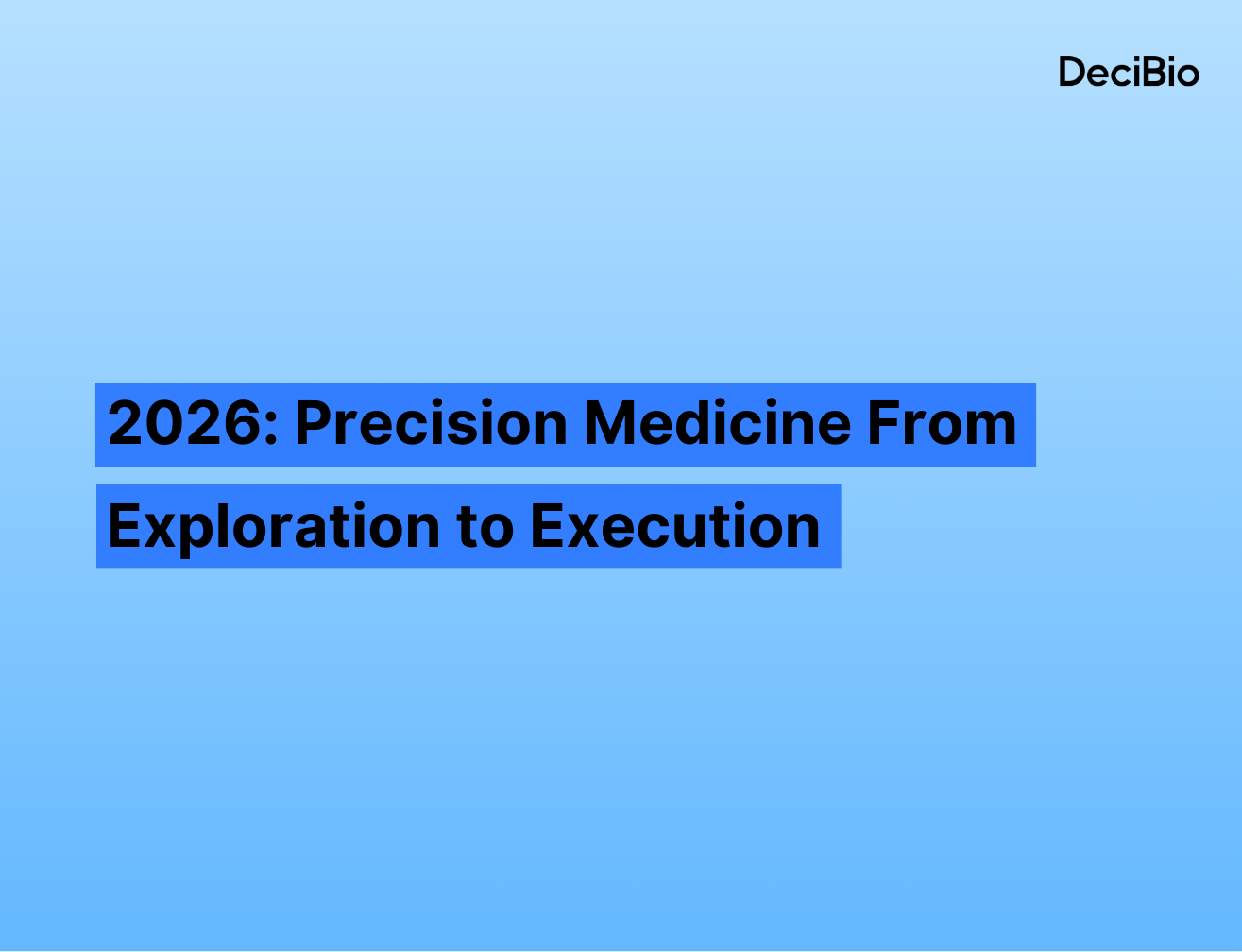Insights provided by DeciBio, a strategy consultancy focused on the life science and biopharma industry.
Highlights & Summary
Intro
May 2025's Next-Gen Therapeutics landscape was particularly rich in clinical trial updates, with both positive and negative announcements.
Happy Reading!
Featured DeciBio Updates
1 | Oligo Therapeutics - Key Trends and Current User Perspectives Ad Board | DeciBio
2 | Heading to BIO? Meet the DeciBio team in Boston in 2 weeks — let’s connect! Conference | DeciBio
Cell Therapy
- Kytopen and Bio-Techne Form Collaboration to Advance Non-Viral Gene Editing in Cell Therapy Production | Partnership
- CARsgen’s Satri-cel Granted Priority Review by China’s NMPA for Advanced Gastric Cancer | Regulatory
- New Coalition Aims to Double CAR-T Access by 2030 | Commercial
- Cellino’s Automated iPSC Platform Receives FDA AMT Designation | Manufacturing
Gene Therapy
- Beacon Shares Additional Clinical Data on XLRP Asset | Clinical Trial
- Atsena Releases Positive Clinical Data for ATSN-201 | Clinical Trial
- J&J’s XLRP Asset Misses Phase 3 Endpoint | Clinical Trial
- Sangamo Announces Long-Term Follow-Up in Fabry Trial | Clinical Trial
- Rocket Pharma Announces Patient Death in Danon Disease Trial | Clinical Trial
Oligo Therapy
- AbbVie and ADARx Pharmaceuticals Announce Multi-Billion Dollar Collaboration for siRNA Therapies | Partnership
- Sirius Therapeutics Secures $50 Million Financing to Advance siRNA Pipeline for Cardiometabolic Diseases | Financing
- CRISPR Therapeutics and Sirius Therapeutics Announce Multi-Target Collaboration for siRNA Cardiovascular Pipeline | Partnership
- Biogen and City Therapeutics Launch $46 Million Strategic Collaboration for RNAi CNS Drug Development | Partnership
- Ionis Reports Positive Phase 3 Results for Olezarsen in Moderate Hypertriglyceridemia | Clinical Trial
Antibody-Drug Conjugates
- Gilead ASCENT-03 Study Demonstrates Positive Results | Clinical Trial
- Patritumab Deruxtecan Fails to Improve Overall Survival for NSCLC Patients; Merck and Daiichi Sankyo Pull Application for FDA Approval | Clinical Trial
- Astellas and Evopoint Biosciences Enter Licensing Agreement for a CLDN18.2 Targeting ADC | Partnership
- DualityBio and Avenzo’s AVZO-1418/DB-1418 Receives FDA Clearance for Clinical Trial | Clinical Trial
Cell Therapy
Kytopen and Bio-Techne Form Collaboration to Advance Non-Viral Gene Editing in Cell Therapy Production | Partnership
Kytopen and Bio-Techne have announced a partnership to streamline cell therapy manufacturing by integrating their respective non-viral gene editing platforms. The collaboration combines Bio-Techne's TcBuster GMP transposon system, capable of delivering large, multigene cargos with high efficiency, and Kytopen's Flowfect Tx platform, which enables rapid, high-viability processing of billions of cells through a continuous flow system. This integrated workflow aims to expedite the development and manufacturing of advanced immune cell therapies, particularly for non-dividing or apoptosis-sensitive cell types. Data from this collaboration were presented at the International Society of Cell & Gene Therapy (ISCT) Annual Meeting in May 2025.
CARsgen’s Satri-cel Granted Priority Review by China’s NMPA for Advanced Gastric Cancer | Regulatory
CARsgen Therapeutics announced that the Center for Drug Evaluation (CDE) of China’s National Medical Products Administration (NMPA) has granted Priority Review status to satricabtagene autoleucel (satri-cel, CT041), an autologous CAR T-cell therapy targeting Claudin18.2, for the treatment of Claudin18.2-positive advanced gastric/gastroesophageal junction adenocarcinoma (G/GEJA) in patients who have failed at least two prior lines of therapy. Satri-cel has previously received Breakthrough Therapy Designation from the NMPA in March 2025 and Regenerative Medicine Advanced Therapy (RMAT) designation from the U.S. FDA in January 2022. The therapy is currently being evaluated in multiple clinical trials, including a confirmatory Phase II study in China (CT041-ST-01, NCT04581473) and a Phase 1b/2 trial in North America (CT041-ST-02, NCT04404595). This Priority Review designation is expected to expedite the regulatory process, potentially bringing this first-in-class CAR T-cell therapy to patients with limited treatment options more swiftly.
New Coalition Aims to Double CAR-T Access by 2030 | Commercial
A new coalition, led by the American Society for Transplantation and Cellular Therapy (ASTCT) and the National Marrow Donor Program (NMDP)/Be The Match, has launched an initiative to double the proportion of eligible U.S. patients receiving CAR T-cell therapy by 2030. Currently, only about 20% of eligible patients access these therapies. The coalition plans to address barriers such as manufacturing capacity, reimbursement challenges, and workforce limitations. Key strategies include expanding manufacturing infrastructure, streamlining regulatory processes, and enhancing provider education. The initiative has garnered support from over 50 organizations, including major CAR-T developers like Novartis, Gilead, Bristol Myers Squibb, and Johnson & Johnson.
Cellino’s Automated iPSC Platform Receives FDA AMT Designation | Manufacturing
Cellino has secured the FDA’s Advanced Manufacturing Technology (AMT) designation for its biomanufacturing platform, which automates the production of induced pluripotent stem cells (iPSCs). This laser-based system replaces manual processes like colony picking and passaging, enabling closed, cartridge-based workflows that reduce operator variability and support large-batch production. The AMT designation, granted by the FDA’s Center for Biologics Evaluation and Research (CBER), allows for prioritized regulatory engagement and rolling data submissions during IND, BLA, and NDA reviews, potentially accelerating time to market. Cellino aims to leverage this to advance its autologous iPSC therapies, addressing manufacturing bottlenecks that have historically limited clinical translation.
Bristol Myers to Close Illinois Cell Therapy Site Amid Cost-Cutting Measures | Manufacturing
Bristol Myers Squibb is shutting down its viral vector production facility in Libertyville, Illinois, as part of a broader cost-reduction strategy. The site, acquired from Novartis in 2023 to bolster CAR-T therapy manufacturing, is being closed just two years after the acquisition. While the company confirmed the closure, it has not disclosed the number of employees affected. This move aligns with Bristol Myers' ongoing efforts to streamline operations and reduce expenses across its global manufacturing network. The closure may impact the production of viral vectors essential for the company's CAR-T therapies, including Breyanzi and Abecma.
Gene Therapy
Beacon Shares Additional Clinical Data on XLRP Asset | Clinical Trial
Beacon Therapeutics shared six-month interim results from its Phase 2 DAWN trial of laru-zova in X-linked retinitis pigmentosa (XLRP), showing early improvements in visual function, including low luminance visual acuity and retinal sensitivity. The gene therapy was generally well-tolerated, with no serious safety issues reported, supporting continued development in the ongoing pivotal VISTA trial.
Atsena Releases Positive Clinical Data for ATSN-201 | Clinical Trial
Atsena Therapeutics reported positive interim results from Part A of its Phase I/II LIGHTHOUSE study of ATSN-201, a gene therapy for X-linked retinoschisis (XLRS), showing structural and functional improvements across all dose levels with no treatment-related serious adverse events. Seven of nine treated patients showed closure of foveal schisis and two-thirds demonstrated meaningful microperimetry gains, supporting the potential of the company’s novel spreading AAV.SPR capsid and informing the ongoing Part B adult and pediatric expansion.
J&J’s XLRP Asset Misses Phase 3 Endpoint | Clinical Trial
Johnson & Johnson’s gene therapy bota-vec failed to meet its primary endpoint in the Phase 3 LUMEOS trial for X-linked retinitis pigmentosa (XLRP), according to a recent update on the company’s healthcare provider website. While the therapy showed some improvement on secondary measures, the result adds to a growing list of AAV gene therapy setbacks across major biopharma, prompting J&J to reassess its strategic options.
Sangamo Announces Long-Term Follow-Up in Fabry Trial | Clinical Trial
Sangamo Therapeutics announced that all 32 patients dosed in its Phase 1/2 STAAR trial for Fabry disease gene therapy ST-920 have reached the FDA-required 52-week follow-up, with early data showing a continued positive mean eGFR slope and good tolerability. Following a productive FDA meeting in April, the company believes it has a clear CMC pathway and plans to submit a BLA in Q1 2026, potentially paving the way for U.S. approval and commercial launch in the second half of 2026.
Rocket Pharma Announces Patient Death in Danon Disease Trial | Clinical Trial
Rocket Pharmaceuticals has paused its Phase 2 trial of RP-A501 for Danon disease after a patient experienced a serious adverse event linked to capillary leak syndrome and later died from an acute systemic infection. The FDA placed the study on clinical hold on May 23 to allow further investigation, as Rocket examines whether a newly introduced immune suppression agent contributed to the event.
Oligo
AbbVie and ADARx Pharmaceuticals Announce Multi-Billion Dollar Collaboration for siRNA Therapies | Partnership
AbbVie and ADARx Pharmaceuticals have entered a strategic collaboration and license option agreement to develop next-generation small interfering RNA (siRNA) therapeutics across neuroscience, immunology, and oncology. ADARx will receive a $335 million upfront payment and is eligible for several billion dollars in additional option fees, milestone payments, and tiered royalties based on future development and commercialization success. The collaboration will leverage ADARx’s proprietary siRNA technology for sustained and precise mRNA silencing, while AbbVie will contribute its expertise in antibody engineering, antibody-drug conjugates, and advanced tissue delivery approaches to augment ADARx’s discovery efforts.
Sirius Therapeutics Secures $50 Million Financing to Advance siRNA Pipeline for Cardiometabolic Diseases | Financing
Sirius Therapeutics has raised nearly $50 million in a Series B financing round led by existing and new investors to accelerate the clinical development of its siRNA therapeutics targeting cardiometabolic diseases. The proceeds will support advancement of Sirius’ lead candidate, SIR-101, which is in Phase 1 clinical trials for patients with severe hypertriglyceridemia and mixed dyslipidemia. SIR-101 utilizes proprietary GalNAc-conjugation technology for targeted delivery to hepatocytes, aiming to achieve potent and durable gene silencing with infrequent dosing. The funding will also enable the company to expand its pipeline to address additional genetically validated targets implicated in cardiovascular and metabolic disorders.
CRISPR Therapeutics and Sirius Therapeutics Announce Multi-Target Collaboration for siRNA Cardiovascular Pipeline | Partnership
CRISPR Therapeutics and Sirius Therapeutics have entered a collaboration to co-develop and co-commercialize SRSD107, a next-generation, long-acting siRNA targeting Factor XI (FXI) for thromboembolic disorders. The agreement includes a $25 million upfront cash payment and $70 million in equity from CRISPR Therapeutics to Sirius and gives CRISPR Therapeutics the option to license up to two additional siRNA programs. In Phase 1 clinical trials, SRSD107 achieved over 93% reduction in FXI activity and more than a twofold increase in activated partial thromboplastin time, with effects maintained for up to six months after a single dose. A Phase 2 clinical trial of SRSD107 is being initiated to evaluate its safety and efficacy for prevention of venous thromboembolism in patients undergoing total knee arthroplasty.
Biogen and City Therapeutics Launch $46 Million Strategic Collaboration for RNAi CNS Drug Development | Partnership
Biogen and City Therapeutics have entered a strategic research collaboration to develop novel RNA interference (RNAi) therapies, initially focusing on a single target implicated in central nervous system diseases. Under the agreement, City Therapeutics will receive $16 million upfront and a $30 million investment from Biogen via a convertible note, with the potential to earn up to $1 billion in milestone payments and tiered royalties on net sales. Biogen will lead IND-enabling studies, global clinical development, regulatory submissions, and commercialization activities for the selected programs. City Therapeutics will apply its next-generation RNAi engineering technologies to design an RNAi trigger molecule, while Biogen will provide proprietary drug delivery technology aimed at enabling systemic administration. The collaboration includes an option for Biogen to expand to an additional target with further payment, subject to target availability.
Ionis Reports Positive Phase 3 Results for Olezarsen in Moderate Hypertriglyceridemia | Clinical Trial
Ionis Pharmaceuticals announced that the Phase 3 Essence study of olezarsen in nearly 1,500 adults with moderate hypertriglyceridemia met its primary endpoint, demonstrating a statistically significant placebo-adjusted reduction in triglyceride levels of 61% and 58% at six months with 80 mg and 50 mg monthly doses, respectively. The trial population included patients with or at risk for atherosclerotic cardiovascular disease, most of whom were already on standard lipid-lowering therapies. Olezarsen also met all key secondary endpoints, with the vast majority of participants achieving triglyceride levels below 150 mg/dL, reflecting normalization. The safety and tolerability profile was favorable, with mild injection site reactions being the most common adverse event. Data from pivotal Phase 3 CORE and CORE2 studies in severe hypertriglyceridemia are expected in the third quarter of 2025.
Moderna Receives FDA Approval for mNEXSPIKE COVID-19 Vaccine | Regulatory
The FDA approved Moderna’s mNEXSPIKE (mRNA-1283) COVID-19 vaccine for adults 65 and older and individuals aged 12–64 with at least one CDC-defined underlying risk factor. Approval was based on a Phase 3 randomized, observer-blind, active-controlled trial enrolling approximately 11,400 participants aged 12 and up, comparing mNEXSPIKE (10 μg) to Spikevax (mRNA-1273, 50 μg). mNEXSPIKE demonstrated a 9.3% higher relative vaccine efficacy than mRNA-1273 in participants 12 years and older, and a 13.5% higher efficacy in adults 65 and older in subgroup analysis. The safety profile of mNEXSPIKE was similar to mRNA-1273, with fewer local reactions and comparable systemic side effects, most commonly injection site pain, fatigue, headache, and myalgia. The vaccine is expected to be available for eligible U.S. populations for the 2025–2026 respiratory virus season, alongside Spikevax and mRESVIA, Moderna’s RSV vaccine.
ADCs
GSK’s Blenrep Re-Enters EU Market for Multiple Myeloma | Regulatory
GSK’s Blenrep has received a positive opinion from the European Medicines Agency’s Committee for Medicinal Products for Human Use (CHMP) for use in relapsed or refractory multiple myeloma. The recommendation is based on two successful Phase 3 trials, which demonstrated meaningful improvements in progression-free survival. Blenrep has already secured approval in the U.K., received an endorsement in Japan, and is currently under FDA review for potential use in combination regimens.
AbbVie’s Emrelis for NSCLC Receives Accelerated FDA Approval | Regulatory
AbbVie’s Emrelis has been approved by the FDA for treating advanced non-squamous non-small cell lung cancer (NSCLC) in patients with high c-Met expression and no EGFR mutations. Approximately 25% of advanced non-squamous NSCLC patients have c-Met overexpression, and half of those may be eligible for Emrelis. Patient selection is supported by Roche’s companion diagnostic, the VENTANA MET (SP44) RxDx assay. Approval was based on Phase 2 data showing a 35% overall response rate.
Gilead ASCENT-03 Study Demonstrates Positive Results | Clinical Trial
Gilead’s Phase 3 ASCENT-03 trial met its primary endpoint, showing that Trodelvy significantly improved progression-free survival over chemotherapy in patients with metastatic triple-negative breast cancer (mTNBC) who are not eligible for PD-1/PD-L1 inhibitors. Positive results were also reported in ASCENT-04, which evaluated Trodelvy in combination with Keytruda for PD-L1+ mTNBC, suggesting potential as a first-line treatment for a broader population. Full ASCENT-04 data will be presented at ASCO.
Patritumab Deruxtecan Fails to Improve Overall Survival for NSCLC Patients; Merck and Daiichi Sankyo Pull Application for FDA Approval | Clinical Trial
The Biologics License Application for HER3-DXd, seeking accelerated approval, has been voluntarily withdrawn. This decision follows the HERTHENA-Lung02 Phase 3 trial, where the drug failed to meet the threshold for statistical significance in overall survival. The trial involved patients with advanced or metastatic EGFR-mutated NSCLC who had received prior systemic therapies.
Astellas and Evopoint Biosciences Enter Licensing Agreement for a CLDN18.2 Targeting ADC | Partnership
Astellas has signed an exclusive licensing agreement with Evopoint Biosciences for XNW27011, an antibody-drug conjugate targeting CLDN18.2. The candidate is in Phase 1/2 trials in China for gastric, pancreatic, and gastroesophageal cancers. Astellas will pay $130 million upfront and could owe up to $1.34 billion in milestones, plus royalties, based on clinical, regulatory, and commercial progress.
DualityBio and Avenzo’s AVZO-1418/DB-1418 Receives FDA Clearance for Clinical Trial | Clinical Trial
The FDA has cleared DualityBio and Avenzo Therapeutics’ bispecific EGFR/HER3-targeting ADC, AVZO-1418 (also known as DB-1418), to enter clinical trials. Preclinical data presented at AACR in April showed high binding affinity to EGFR and HER3 co-expressing tumor cells, with efficacy demonstrated in xenograft models across multiple tumor types, including NSCLC. Avenzo holds global rights outside Greater China and will lead development and commercialization efforts.

.png)








.png)



